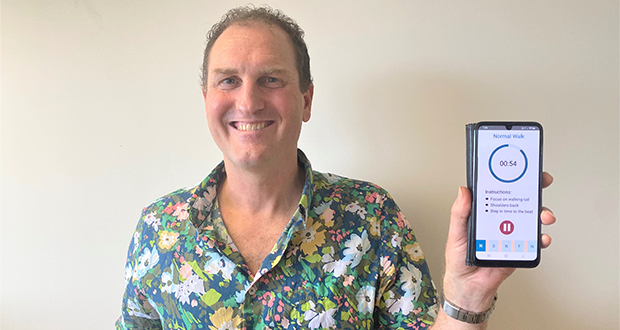New app helps people with Parkinson’s gait

The University of NSW (UNSW) has launched a new app to help people with Parkinson's Disease learn to walk better and for longer.
Walking Tall was released last week by a team of UNSW biomedical engineers – led by Dr Matthew Brodie – in hopes of helping people with Parkinson's with their gait.
"Those who live with Parkinson's Disease have to think about every single step they take," Dr Brodie said.
"We asked them how much mental effort it takes for them to walk, and often they would say 100 per cent."
"This app can give people confidence and also a sense of achievement that they can be empowered and do something for themselves to help their own condition."
At present, around 150,000 Australians have Parkinson's Disease, with 38 new cases being diagnosed every day.
Around 70 per cent of aged-care residents live with moderate to severe cognitive impairments, including dementia.
An estimated 8 per cent of the aged-care population have Parkinson's.
People with Parkinson's disease frequently find their gait affected, have diminished coordination, and significantly reduced step length.
Gait dysfunction also led to falls in around 70 per cent of those with Parkinson's Disease.
Dr Brodie said it was important for the team to listen to individuals with Parkinson's during the development to make sure it was designed to help them.
"This app is co-designed by people with Parkinson's, for people with Parkinson's," Dr Brodie told Aged Care Insite.
"The app lowers the barriers for people with Parkinson's to train themselves to walk. We tell them that doing as little as six minutes a day, three days a week, will still help."
Dr Brodie said the app's use of a metronome helped people to visualise and replaced "the need to think about walking".
"Sometimes they need to visualise a walking style because often people with Parkinson's suffer from hypokinesia – where their movements are not actually as big as they feel they are."
"Walking Tall encouraged them to take exaggerated steps, which will actually be more like regular steps."
For Walking Tall's future, Dr Brodie said technical issues such as Bluetooth connectivity were first on the list to address before tackling major extensions to the project.
"I want to help the 10 million people worldwide with Parkinson's Disease walk," Dr Brodie said.
"That is my vision, and today we've taken a small step in that direction."
Email: [email protected]





